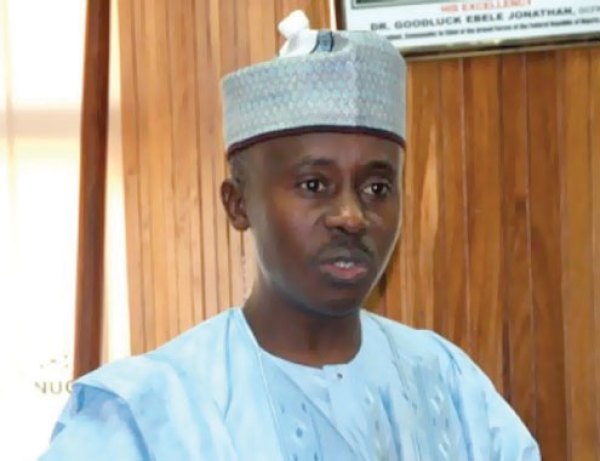Former House of Representatives member, Farouk Lawan, was released from prison on Tuesday after serving five years for bribery. Upon his release, he declared this the “beginning of a new chapter” in his life. But what could this new chapter hold for the once-influential figure in Nigerian politics?
Lawan, who represented Bagwai/Shanono Federal Constituency of Kano State from 1999 to 2015, reached his pinnacle of national prominence as the chairman of the ad hoc House committee investigating the 2012 subsidy fraud during President Goodluck Jonathan’s administration.
Before this, Lawan was widely respected for his strong anti-corruption stance, earning him the nickname “Mr. Integrity.” He played a central role in a major leadership crisis in the House, leading a faction known as the Integrity Group, which facilitated the removal of the first female Speaker, Patricia Etteh, and the election of Dimeji Bankole, the youngest Speaker in Nigeria’s history.
However, Lawan’s political ascent was short-lived. In 2012, he was caught in a bribery scandal. And after years of legal battles, he was convicted in 2021 and sentenced to seven years in prison for requesting and receiving a $500,000 bribe from businessman, Femi Otedola, to remove the latter’s company from a list of firms implicated in the subsidy fraud. The Court of Appeal later reduced the sentence to five years, a decision upheld by the Supreme Court in 2023.
- How traders’ invasion obstructs learning at 84-year-old school
- I don’t own a house in Abuja — Mohammed Abba Gana (former Minister, FCT)
With his release, speculation has grown over Lawan’s political future, especially as rumours of his potential defection from the People’s Democratic Party (PDP) to the ruling All Progressives Congress (APC) started gaining grounds even before he left the custodial centre.
Legal implications for Lawan’s future
Hameed Jimoh, an Abuja-based legal practitioner, explained that the Nigerian Constitution provides guidelines on the eligibility of ex-convicts for elective office. Section 137(1)(d) of the 1999 Constitution (as amended) disqualifies individuals who have been convicted and under “imprisonment or fine for any offence involving dishonesty or fraud (by whatever name called) or for any other offence, imposed on him by any court or tribunal or substituted by a competent authority for any other sentence imposed on him by such a court or tribunal.”
However, exceptions exist. If an ex-convict is granted a pardon by a competent authority, such as the president or a governor, or if the crime is considered a political offence, the individual may still run for office.
Jimoh noted that Lawan, who was sentenced to five years, would only qualify to contest if he receives an official pardon. However, the bribery conviction complicates matters, as Section 137(1)(e) specifically disqualifies anyone convicted of an offence involving dishonesty, regardless of the sentence length.
“Bribery is classified as a crime involving dishonesty, so Lawan remains disqualified from holding an elective office without a pardon,” Jimoh said.
Are political appointments a possibility?
While Lawan may be barred from running for office, political appointments present a different scenario. Another legal expert, who requested anonymity, explained that the Nigerian Constitution does not explicitly prohibit ex-convicts from being appointed to political offices. However, the appointing authority must weigh public sentiment and ethical considerations before making such a decision.
“In Lawan’s case, his bribery conviction may cause public and ethical concerns, which could complicate his potential appointment,” the legal expert noted.
Beyond the legal aspects, there is the question of public perception. Though Lawan may have the legal right to pursue appointments, his conviction for bribery could tarnish his reputation, making it difficult for him to regain public trust.
Jimoh urged caution regarding Lawan’s potential reintegration into political life.
“His conviction is a serious matter, and it sends the wrong message if he quickly returns to the political scene. Any reintegration must be handled carefully to avoid undermining public confidence in the fight against corruption,” he said.
As Lawan begins this “new chapter,” the road ahead is fraught with challenges. Legally, his conviction bars him from contesting elections unless he receives a pardon. Even if he seeks a political appointment, his conviction may be a significant obstacle. Moreover, rebuilding his public image after a high-profile bribery scandal will not be easy.
Analysts believe that in the short term, Lawan may take time to realign and reflect on his next steps. Whether he seeks a pardon or attempts to re-enter public service through appointments, the coming months will be crucial in determining the trajectory of his post-prison life.
Ultimately, while Lawan’s release may mark the start of a new chapter, his political future remains uncertain. Any return to the spotlight will require careful navigation of both legal hurdles and public opinion, analysts observed.

 Join Daily Trust WhatsApp Community For Quick Access To News and Happenings Around You.
Join Daily Trust WhatsApp Community For Quick Access To News and Happenings Around You.


